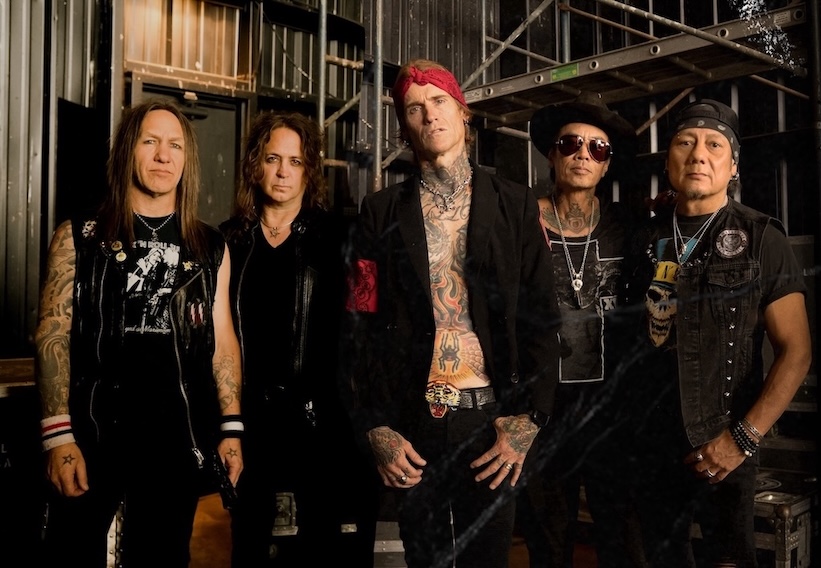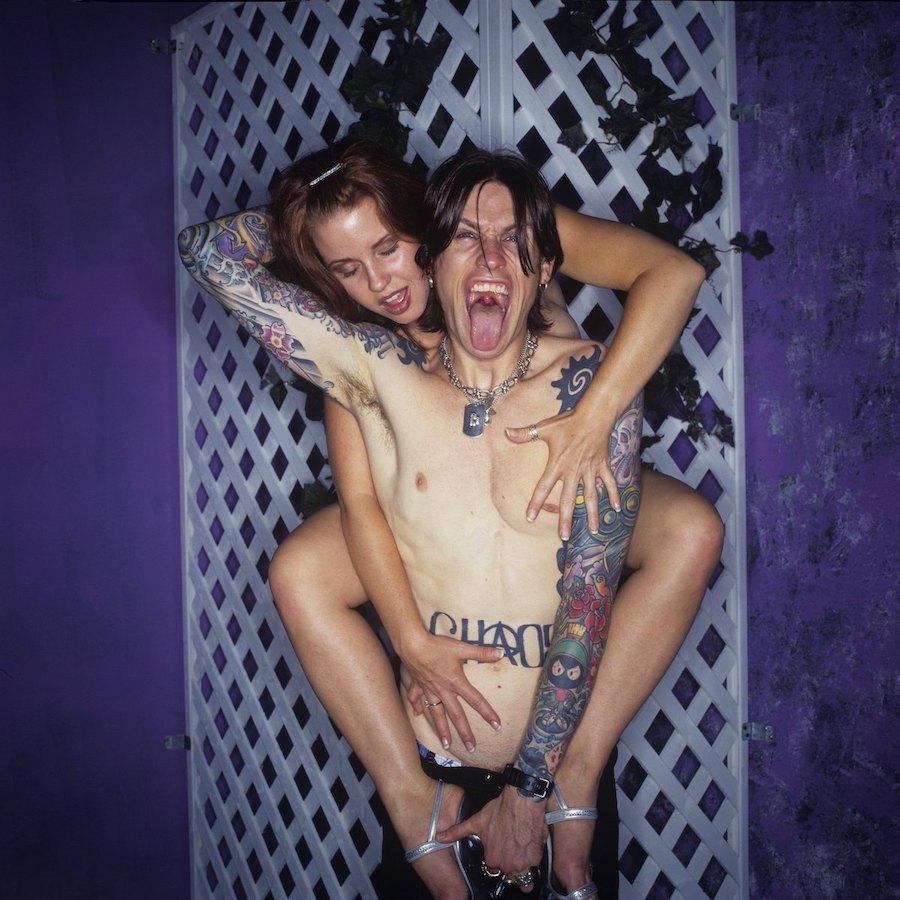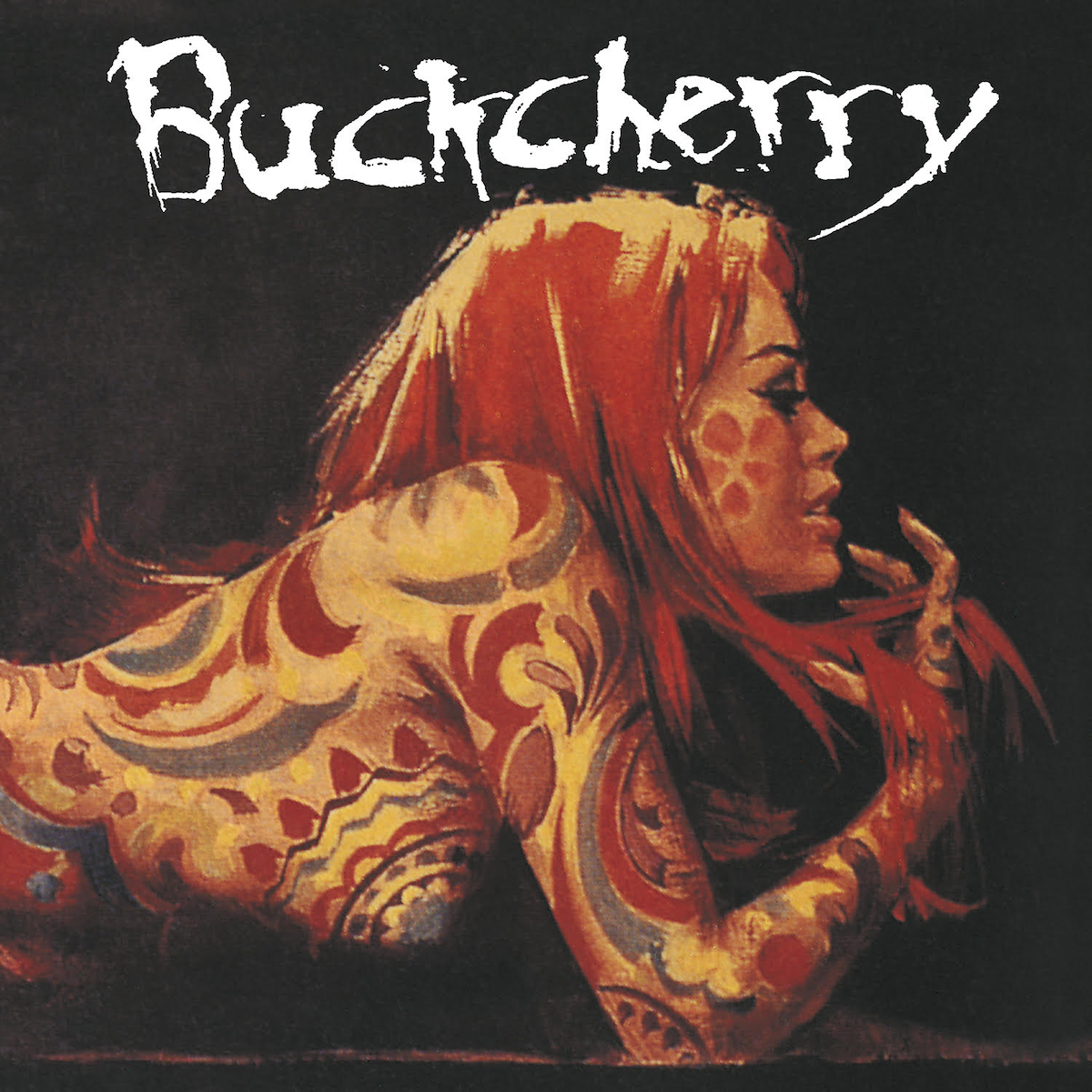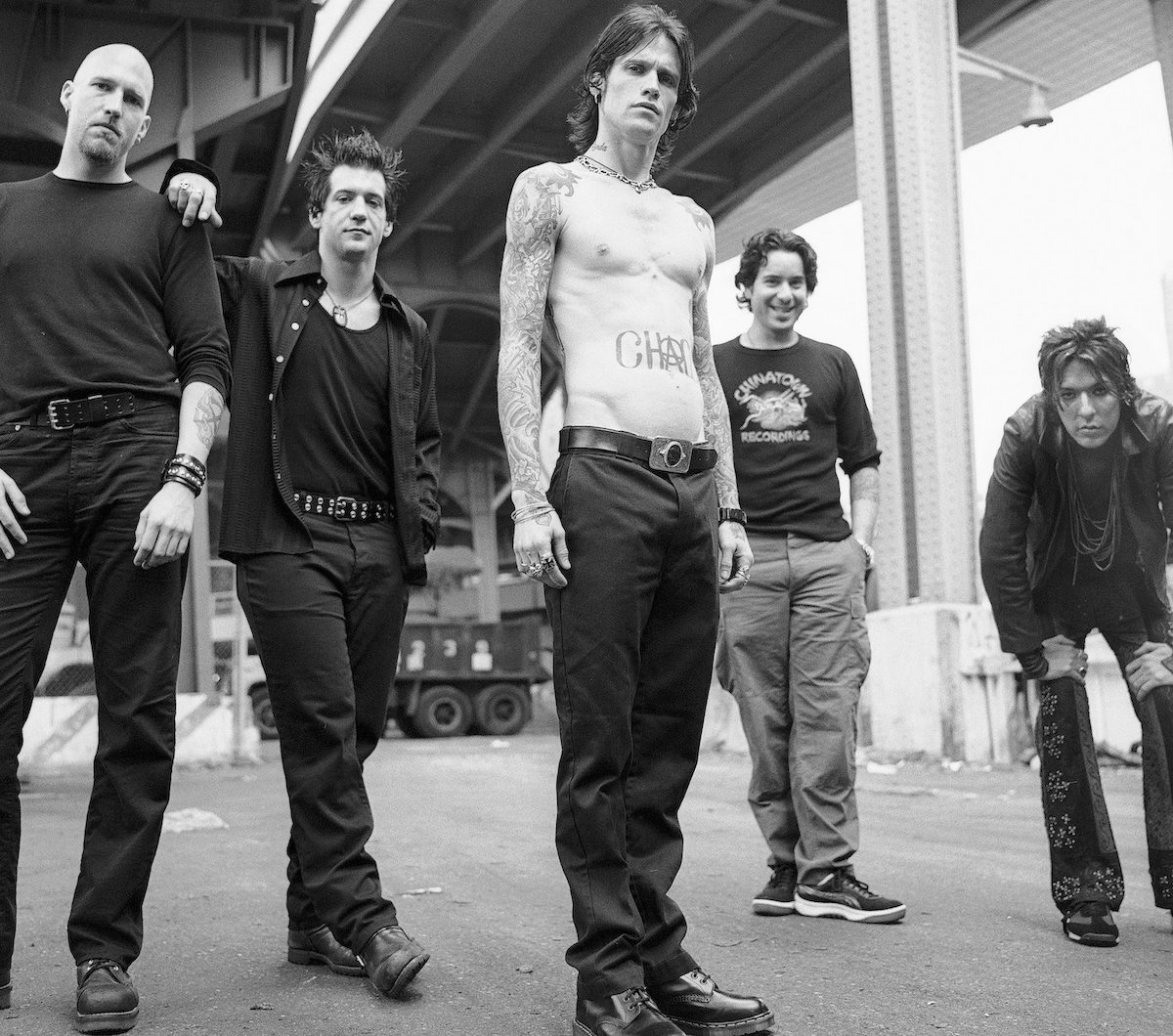
Mainstream media loves to drag Buckcherry. The group has been criticized for being derivative and cliché, a discount AC/DC riddled with inconsistencies. On the surface, that’s understandable. Frontman and principal songwriter Josh Todd looks deranged and unhinged. Some of their biggest songs have titles like “Crazy Bitch,” “Lit Up,” and “Say Fuck It.” Between Todd and the other longest-running member of Buckcherry, Stevie Dacanay, there is barely a centimeter of uninked skin visible.
“Hey, I’m grateful to have the opportunity to be pigeonholed,” says Dacanay. “That means people are hearing us and forming opinions. A lot of people think, ‘These guys are reckless. All they care about is cocaine and crazy bitches and partying.’ But there are more layers than that. To be able to sustain this career takes a lot. To achieve the milestones we have takes a lot intellectually, emotionally, and spiritually.”
More from Spin:
- Left of the Dial: ‘The Current is the Heart and Soul of Minnesota Music’
- Bon Iver Turn The Page On First Album In Six Years
- My Morning Jacket Find The Groove On ‘Squid Ink’

Over 25 years after the critical and commercial success of Buckcherry’s self-titled debut—which arrived a decade after the hard rock boom of the ’80s—the group is going strong. They spend more days per year on the road than at home in Los Angeles. Their 11th album, Roar Like Thunder, is slated for June of this year. Plus, they are celebrating the 20th anniversary of their comeback album, 15, with a limited two-LP metallic marble vinyl release which includes the bonus acoustic versions of their hits “Crazy Bitch” and “Sorry” as well as “Onset” and “Sunshine,” plus a power version of Elvis Costello’s “Pump it Up.”
“Buckcherry has always been the black sheep of rock music,” acknowledges Todd. “They call us the kings of the B markets. We base everything on our live show and touring. We play everywhere except major cities. Timbuktu in the middle of winter on an outdoor stage with 2,000 people who have nothing else to do? Let’s do it!”

A couple of days after disembarking from ShipRocked, Todd sits across from me at his local diner, a baseball cap askew on his head, unsmiling, his jaw taut, the words “Stay Gold” tattooed across his knuckles—a nod to Stevie Wonder and The Outsiders. Even when he says he’s having a senior citizen moment when he forgets a name, his rock star “it factor” is undeniable. He has the twitchy energy of a junkie, but Todd has been sober for at least three decades, before the formation of Buckcherry. Yet, when Buckcherry performs, Todd projects the immortality that attracts audiences to iconoclastic and destructive musicians.
“Buckcherry is our audience’s escapism,” says Dacanay. “They come to see the obvious hits, but they also come to see the skinny guy with the tattoos dance. Maybe a handful are coming to see that Filipino guy play guitar. But it’s mainly Josh, that persona he’s created. A lot of the attributes that people come to see and what people think make him great are the same things that drive us crazy behind the scenes. It’s not easy being around somebody that intense.”
Todd has been through a lot, starting with his father’s death by suicide when Todd was 10 years old. He embarked on his downward drug and alcohol spiral at the start of his teens. He reached a point where he was going on meth runs and drinking around the clock, passing out twice a day, dealing with alcohol poisoning, and not eating. In the middle of this nihilistic behavior, he became an expectant father and was arrested for a DUI. The arresting officer recognized how lost Todd was and issued him a month’s worth of AA meetings. The program didn’t click with him straightaway, but it did eventually, and he’s still a regular attendee.

In close addiction tandem with Todd, Dacanay was dealing with his share of demons. “We were roommates and best friends and rode it ’til the wheels fell off,” Dacanay says of the two’s early days, which trace back to the ’80s. Dacanay returned to his hometown of Chicago and entered rehab, which was unsuccessful. He had joined ExtraVery (coincidentally my husband’s band at the time) and was working at Chicago’s legendary venue, the defunct Double Door where he saw Todd on the TV performing “Lit Up.”
On a trip to Los Angeles with ExtraVery, Dacanay reconnected with Todd who he noticed was, “Different…the lights were on. His skin is good. He’s clear. He’s engaged. And I’m like, ‘What’s different with you?’ And he said, ‘I got sober.’ I couldn’t believe it.”
Once ExtraVery disbanded, Dacanay found himself calling an ambulance two nights in a row due to overdosing. He reached out to Todd to ask him how to stop. “That’s when he helped get me sober,” Dacanay says.
Dacanay has 25 years of sobriety in his rearview, and the reconciliation of Todd and Keith Nelson, Buckcherry’s original guitar player, to his credit. Todd and Nelson weren’t on speaking terms after being dropped from their major label deal. Dacanay relayed messages between them until they began talking directly. This led to Dacanay playing a gig with Buckcherry, the band rehearsing, writing one song, then writing the rest of the songs that became 15.
A forensic listen to Buckcherry’s songs and Todd’s traumas and triumphs are evident. “I didn’t get into music to get laid,” he says. “I talk about my past a lot in recovery. I’ve had a lot of great times. It wasn’t always doom and gloom, it just got there eventually. I touch on all that stuff in my memory when I’m writing songs. I want to celebrate that. People go to a rock show because they want to have fun. And I want to have fun. But I always wanted to be honest with how I feel with what I’m singing about. Music is therapeutic for me. It was the only thing that consistently made me happy.”

As rich as his personal material is, Todd, turns his songwriting focus outward as well drawing from other people’s experiences and books. “The great challenge of songwriting is not making it so much about yourself to where no one can relate to it,” he says. “But I will craft it in a way where I can attach myself personally to it so I can sing a song 1,000 times and still be very passionate about the performance.”
Todd is a voracious reader of true crime, but also of nonfiction, especially self-help. He mentions Sun Tzu’s The Art of War, Deepak Chopra’s The Seven Spiritual Laws of Success, Dave Pelzer’s A Child Called “It,” as well as the works of Dr. Joe Dispenza whose guided meditation practice he follows, and Tony Robbins whose “Unleash the Power Within” program he completed just before writing 15.
The regimen with which Todd regulates his life is enviable. He’s an early riser, 5:00 a.m.. He works out, meditates, and does affirmations before saying good morning to his family. He also spends at least 10 minutes with his dog in nature daily, observing and breathing.
“It’s not about drinking and using for me anymore,” he says. “It’s way more intense than that. It’s about not existing anymore. The chatter between my ears, over the years, it’s like my disease is doing push-ups. It gets super intense. I have to do a lot of things to combat it. I do not take any medication. I don’t want it in my body. So that means I have to do all these other things to set my foundation every day. Once I set the tone for the day with this spiritual regimen, that stops the committee [in my head]. When I don’t do that, the defeating thoughts, to this day, it’s incredible.”

Todd admits he is obsessive-compulsive, especially when it comes to making records. His switch is always flipped to “on,” and he knows it drives everyone nuts, particularly Dacanay. “After being on the road for say, six straight weeks, we should decompress for a day or two,” says Dacanay. “But I don’t remember the last day off I’ve had. Josh doesn’t miss a day. He’s got to have something to work on all the time.”
The coinciding of Todd doing the Tony Robbins program and the organic success of 15 seem inextricably intertwined. But according to Todd, “No one cared” about 15.
“Buckcherry trying to get a deal with ‘Crazy Bitch’ was impossible, everyone had passed on us twice,” says Dacanay. “We were in our late 20s, early 30s. We were too old. It was rumored that we were hard to work with. And by this time, I was so traumatized from the whole music business that I had no expectations. Even if we got a record deal, what’s it going to do anyway? We’re going to tour one song, and then we’re going to get dropped.”
They struck a small deal with Sony Japan, which allowed Buckcherry to record the album in 15 days, hence the title. Stateside, their manager set up Eleven Seven Music to release 15, with distribution through Atlantic Records (who had an upstream clause they never exercised). Before an official release, “Crazy Bitch” gained traction on MySpace. Radio stations made their own FCC-approved edits so they could play the song. “Then,” Todd says, “everybody wanted to be our friends again.”
“Crazy Bitch”—inspired in part by the Kim Kardashian sex tapes and the fact that Todd couldn’t attract any sane girls when he was in high school, whose chorus he sang into his mother’s voicemail so he wouldn’t forget it—is still Buckcherry’s set closer. The momentum continued with “Sorry” cracking the Top 10 on Billboard’s Hot 100. The double platinum 15 hit No. 2 on the Billboard Independent Albums chart and even entered the Top 40 on the Billboard 200 chart. All accomplished wholly independently.
“I grew up listening to independent records: 7 Seconds, GBH, Black Flag, Subhumans, Circle Jerks,” says Todd. “They had to write these chanting choruses to get people to come to their shows. They didn’t have a major telling them what to say or getting them on the radio. That was my mentality. We got back to that because that’s where rock is.”

Todd is sharing stories from the making of 15 on Buckcherry’s Instagram in short, candid videos. But outside of requisite promotional interactions, he keeps away from social media. This dissociation is what the title of the upcoming Buckcherry album, Roar Like Thunder refers to, staying on track when everything is a distraction. There is a song about his blackout drunk days and one about sex inspired by George Michael in Netflix’s Wham! documentary.
Until the release of Roar Like Thunder, Buckcherry continue their never-ending gigs. “It takes a special kind of asshole to do this job,” Dacanay once told my husband, referring to the nonstop touring that takes him and Todd away from their families for weeks at a time. True to form, Buckcherry kicks off “The Northern Exposure” co-headlining tour with Steel Panther on April 11.
Todd has a touring version of his daily regimen, which he structures every day around. He wakes up at the same time, eats the same breakfast, works out at the same time, goes to sound check, does his vocal warmups, performs, then does vocal warm downs and leaves the venue to get to bed.
“I create my own little set of spiritual principles I try to stick to,” he says. “Maybe some of it doesn’t take and some of it does take. I’m not a saint, and I don’t do it perfectly. I want to learn. I want to be open to anything.”
His phone lights up showing a picture of his son Jack and his daughter Willow on his lock screen. They are so fresh and gorgeous, they look like an ’80s Noxzema ad. Josh also has two grandchildren from his eldest daughter, the one who was the main motivation for him to get sober.
“I tell my kids to embrace their youth,” says Todd. “This is when everything is the best it’s going to be inside your body, with your mind, your reflexes, everything. Master something, be great at a young age, set yourself up to have an easy fourth quarter. But you can say that to a teenager until you’re blue in the face and they think they know it all.
He adds, “I don’t want to have regrets. When it comes to music, you better be passionate because it’s a huge sacrifice. The one thing I wanted to be was unforgettable. If you’re not unforgettable, no one gives a shit.”
To see our running list of the top 100 greatest rock stars of all time, click here.
